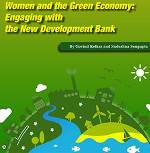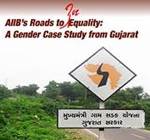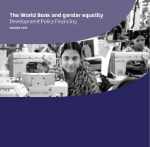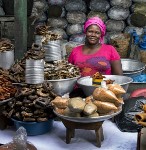| |
|
| |
Women and Green Economy: Engaging with the New Development Bank |
| |
|
| |

|
By Govind Kelkar and Sudeshna Sengupta
The concept of Green Economy has been operationalized for the last 10 years. Politically, the concept became prevalent from the negotiation in Environmental Summit of 1992. Rio 20 became the platform where the idea of Green Economy started growing more prevalent. In a Green Economy, however, the Rights approach to development and gender equeality has been missing. Growth in income and employment is to be driven by public and private investments that reduce carbon emissions and pollution, enhance energy and resource efficiency, and prevent the loss of biodiversity and ecosystem services. Pointing out the Global South concern on conceptualizing Green Economy in a recent webinar hosted by the BRICS Feminist Watch (BFW), Mariama Williams stated that some South feminists were not happy with this agenda as it might shift the focus from sustainable development, especially if the Green Economy only puts price tags on nature and was not concerned about human rights. Feminists are of the opinion that it is important that Green Economy should engage with political, social and environmental concerns and ensure adequate participation of women and recognize their contributions. Women are not to be looked at only as target beneficiaries impacted by the transition process to Green Economy. This position paper presents the progressive feminist position on incorporating Green Economy within the policy domain of New Development Bank (NDB). Read more
|
| |
|
| |
|
| |
UN General Assembly Week of Summits: Q&A |
| |
|
| |
 |
Over a hundred Heads of State or Government are expected to arrive to New York in the last week of September for a series of back-to-back summit meetings at the opening of the General Assembly of the United Nations. On top of the usual photo opportunities and a myriad of bilateral meetings between leaders, this High-level week provides an opportunity for multilateral action to shift away from ’business as usual’ and address some enormous current challenges.
The calendar is certainly crowded: the Climate Action Summit and the High-level Meeting on Universal Health Coverage on 23 September, the Sustainable Development Goals (SDG) Summit on 24-25 September, the High-level Dialogue on Financing for Development (FfD) on 26 September, and the High-level Midterm Review of the SAMOA Pathway on 27 September.
These multiple events enable world leaders to confront policy gaps, address interlinkages among these issues and design policies and actions in an interconnected way. Similar vested interests that resist regulation of the corporate sector to protect the largest greenhouse gas emitters also block increased access to affordable medicines and vaccinations. Further, the conversations on financing the SDGs, particularly on ecological and climate issues cannot be divorced from the programme on Small Island Developing States (SIDS). Read more
|
| |
|
| |
|
| |
AIIB's Roads to Inequality: A Gender Case Study from Gujarat |
| |
|
| |
 |
By Priti Darooka and Sejal Dand
Rural roads have enormous economic and social benefits to the poor in terms of increased agricultural production, lower input and transport costs, increased school enrollment, increased access to health and other services. In addition, rural roads construction, maintenance, and rehabilitation are an excellent employment and income-generating opportunity for the local population.
Mukhya Mantri Grameen Sadak Yojana (MMGSY) or the Chief Minister's Rural Road Project in Gujarat in India was selected as a case study to critically assess inclusion of, and impact on, women and girls at all stages of the project. MMGSY is an Asian Infrastructure Investment Bank (AIIB) funded stand-alone project in India. The Gujarat Rural Roads Project, financed by the Asian Infrastructure Investment Bank (AIIB), seeks to construct and upgrade rural roads to increase connectivity throughout the State. According to the project document, its aim is to provide all-weather rural roads to about 1060 villages in all of the state's 33 districts, benefitting about 8 million people at an estimated cost of USD 1.5 billion.
PWESCR and BRICS Feminist Watch are happy to present this gender analysis report of the project which includes observations, findings and recommendations from the field with an overview of relevant Indian and Gujarat State laws and policies and an analysis of the gaps and track record of implementation. Read more
|
| |
|
| |
|
| |
How Informal Workers are Fighting for Healthcare, Child Care and Safety at Work |
| |
|
| |
By Carlin Carr, WIEGO
Globally, 2-billion people work in the informal economy. They are some of the most vulnerable workers in the world, and they are the new majority. This means that 61% of workers globally rely on work that offers little pay and few protections, and women are particularly at risk.
Public policies and social protection schemes often do not consider these workers, leaving them vulnerable to income losses and struggling to cope after an event or shock.
In this new podcast, Informal Economy: Social Protection, Cyrus Afshar hosts WIEGO social-protection experts, as well as external guests, in wide-ranging discussions on some of the most-pressing issues related to social protection from the perspective of informal workers. These include debates around the future of work, demographic changes and the informal economy, as well as social services, like child care and health that can protect informal workers' incomes. Read more
|
| |
|
| |
|
| |
The World Bank and gender equality |
| |
|
| |
 |
BWP's new briefing explores how the World Bank addresses gender equality in Development Policy Financing (DPF), the World Bank instrument that provides credits, loans or guarantees to borrowing countries through fungible budget support, conditioned on policy reforms. It aims to stimulate further discussion around the linkages between gender equality, macroeconomic policy, and the role of the World Bank, ultimately to help create an enabling macroeconomic policy environment for gender equality.
The briefing presents the Bank's role in shaping macroeconomic and gender policymaking, examining how DPF is designed and illustrating how gendered impacts are examined in policy and practice. In its overarching policy, the Bank states that staff must determine whether “specific policies supported by the operation are likely to have significant poverty and social consequences, especially on poor people and vulnerable groups.” Yet the recent operations outlined as case studies in BWP's briefing highlight a number of gaps and remaining questions regarding the Bank's approach to analysing the potential gendered impacts of policy reforms introduced through this lending instrument.
Without critically and comprehensively reviewing its DPF from a gender perspective, especially in relation to macroeconomic policy reforms, the World Bank is at risk of supporting inconsistent and counterproductive policy reforms, which could undermine its own aims to promote gender equality and contribute to the achievement of the Sustainable Development Goals. Read more
|
| |
|
| |
|
| |
For street vendors, finding water and toilets isn't just a nuisance, it's cutting into earnings |
| |
|
| |
 |
By Carlin Carr, WIEGO
The daily grind of street vendors comes with a host of obvious business challenges: sourcing and preparing goods to sell; attracting a steady stream of customers; and generating enough take-home pay to survive. It's a hustle, and one that these roadside entrepreneurs know well.
But the hustle only goes so far.
Conducting their livelihoods in public spaces, street vendors face difficult challenges extending beyond their everyday business transactions. Woefully inadequate infrastructure, particularly around access to clean water and toilets, often wreaks havoc on their working lives. Multiple costs – including trips to the toilet and water delivery – cut into already meagre earnings. Limited access takes a toll on vendors' mental and physical health, further reducing their earning potential. These are key findings from research by WIEGO and International Institute for Environment and Development (IIED) with street vendors in Nakuru (Kenya) and Durban (South Africa). Read more
|
| |
|
